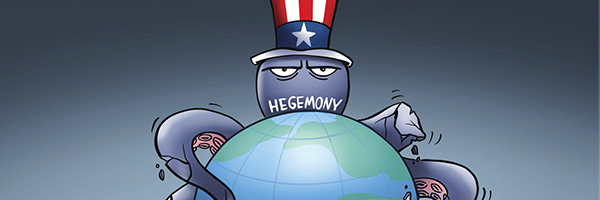US-led unipolar hegemonic order an abnormal state, will be reformed sooner or later
 Global Times,April 11, 2023 —
Global Times,April 11, 2023 —
In more than 30 years since the end of the Cold War, human society has been stuck in US’ unipolar hegemony. It is by no means an abnormal state. Yet Washington is addicted to it and wishes to make it a lasting norm. When a growing number of countries start to pursue benign adjustments to that global order, the US seems to have ants in the pants.
Perhaps being shocked by the ongoing flurry of visits of European leaders to China, French President Emmanuel Macron’s appeal on “strategic autonomy,” and China’s contributive role as a peace builder in the Middle East, some American observers and media outlets can hardly hide their anxiety. Fox News is quite blatant, claiming, “The Future is Now: China, Russia revert to pre-1989 world and fundamentally challenge the US-led West” on Monday. A headline in The Washington Post on the same day read, “China’s new world order is taking shape.” The article underlined that China’s new initiatives over “security” and “civilization” essentially challenge the architecture of the US-led order.
What kind of order is the US-led order? There is only one answer to that question – the unipolar hegemonic order under US domination. Those analyses simply unveiled that the US is fearing losing its global leadership position. The country does not know how to face a different, multipolar order. Actually, it is resisting the arrival of such an order.
Therefore, whenever there are countries that are unwilling to obey US leadership or get in the way of the US cementing its leading role, Washington would feel like having a fishbone stuck in its throat and will waste no time bringing out its stick. To the US’ surprise, today, even Saudi Arabia and France are tired of tolerating the US bossing them around or demanding obedience. That must have touched Washington’s sensitive nerves.
Fox News compares the current international relations to the Cold War. This is an ignorant charge. “The prominent feature of the world structure before 1989 was group confrontation. Let’s see, who is now promoting group confrontation? It is the US,” Yang Xiyu, a senior research fellow at the China Institute of International Studies, told the Global Times.
It is the US that has been taking its allies under a tight grip in an attempt to jointly contain China and Russia, launch economic wars, proxy wars, diplomatic coercion and spread smears. And now, it wants to portray itself as a “gentle giant,” who is reluctant to be challenged. Few will buy this anymore.
What the US confronts is neither China nor Russia, but the trend of a multipolar world, and the call for an improved international order, Xu Liang, an associate professor at the School of International Relations of Beijing International Studies University, told the Global Times.
All countries want independent development but the US attempts to maintain the hegemonic order – this has become the contradiction of the era. The so-called rules-based order is an order that skirted around political colonization after the end of the World War II, but inherited economic and ideological colonization in new forms. The order is not offering fair development opportunities for developing countries. It is unjust and unsustainable. But Washington has long been calling black white in this regard, Shen Yi, an international relations professor at Fudan University, told the Global Times.
Whether the US likes it or not, the momentum of calling for a new world order is rising. De-dollarization has begun. Countries are focusing more on regional multilateral cooperation. The significance of BRICS is surging while the influence of G7 is declining. Organizations such as the Shanghai Cooperation Organisation are becoming more popular. These are trends that the US cannot reverse by creating enemies, piling pressure or imposing coercion on others.
In a recent exclusive interview, Clare Daly, an Irish politician and member of the European Parliament, told the Global Times that the world is in a new dawn of world relations, as the US has lost the hearts and minds of most of the world’s population, while desperately trying to keep the EU, maybe Australia and the UK, as the last group of people to its side.
According to Yang, the trend of multi-polarization will not stop, and the US will do everything in its power to stop this trend. It will continue to shape enemies, boost camp confrontation, and grasp tight its satellite countries. However, no matter what the US does, and what kind of strategy it employs, in the end, the US’ dominant position will be gone with the wind, which will be the fundamental sign of multi-polarization.
The more the US resists such trends by abusing its hegemony, the more division, confrontation and destruction it will bring to the world, which will, in turn, trigger more resistance to the US’ nostalgia for a unipolar world.
